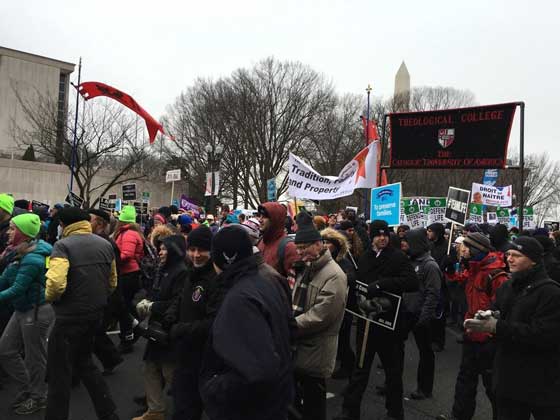Lansing Update: March 4, 2016
Posted March 4, 2016
- Primary Elections Will Be Held This Tuesday — Take the Time to Vote
- Catholic Educators Advocate at the State Capitol This Week
- Michigan House Approves Human Trafficking Hotline Posting Measure
- U.S. Supreme Court Hears Oral Arguments on Texas Abortion Law
Primary Elections Will Be Held This Tuesday — Take the Time to Vote

Next Tuesday, March 8, Michigan will hold its presidential primary and nominees will be chosen for the November general election. Michigan Catholic Conference encourages members to consider the candidates carefully, examining candidate positions on a wide variety of issues important to the Catholic Church, as well as weighing those issues in accordance with their moral importance. More information can be found to help with this process in the U.S. Bishops’ document Forming Consciences for Faithful Citizenship. To confirm your specific polling location and to see if there will be any local issues on your ballot in addition to the candidates, visit the Michigan Voter Information Center.
Catholic Educators Advocate at the State Capitol This Week
This week, a number of Catholic school leaders along with other faith-based colleagues came to Lansing for the Michigan Association of Non-Public Schools Public Policy Day, which was also attended by Michigan Catholic Conference staff. While meeting with state lawmakers, these educators focused on the importance of funding in the state budget to help non-public schools meet state health, safety, and welfare requirements for their students. All Michigan schools, public and non-public, are required by state law to meet these requirements, such as conducting regular fire and lockdown drills, performing criminal background checks for those coming into contact with children, and keeping child immunization records. While public schools receive reimbursement for these requirements in the state budget, non-public schools do not. Michigan Catholic Conference will continue to advocate for this issue of fairness in the coming months. Stay tuned for further updates.
Michigan House Approves Human Trafficking Hotline Posting Measure
Human trafficking, or modern human slavery, continues to be a crime that is not often talked about in society. If legislation continues to move through the State Legislature, however, the National Human Trafficking Hotline (1-888-373-7888) would be posted in a number of public places across Michigan to raise awareness and provide a helpful resource for those in need. House Bill 5107, sponsored by Representative Kurt Heise (R-Plymouth), requires notices with the hotline to be posted at state rest stops and welcome centers, public bus or rail stations, adult entertainment establishments, and public airports. According to Polaris Project as of fall 2015, thirty states already require or encourage a human trafficking hotline number to be posted or promoted within the state. Michigan Catholic Conference supports this legislation, which will connect victims to the assistance they need, increase tips about potential cases for law enforcement, and raise public awareness on human trafficking. The measure received a 95–8 vote in the House. The bill now continues to the Senate Committee on Families, Seniors and Human Services for further consideration.
U.S. Supreme Court Hears Oral Arguments on Texas Abortion Law

This week, the U.S. Supreme Court heard oral arguments in Whole Women’s Health v. Hellerstedt, a case that considers whether or not a Texas law imposes an “undue burden” on women seeking abortions. The 2013 law requires doctors who perform abortions to have admitting privileges at a nearby hospital, and it requires all abortion clinics to meet standards of cleanliness, safety, and staffing requirements found in similar outpatient surgery facilities, or ambulatory surgical centers. In February, the U.S. Conference of Catholic Bishops (USCCB) filed an amicus curiae brief in the case on behalf of the Texas Catholic Conference and several Christian partners who support the law. The brief emphasizes that hospital admitting privileges and ambulatory surgical center requirements protect women’s health and lives. Opponents of the law claim that it serves no medical purpose and is aimed at limiting women’s access to abortions. Whole Women’s Health v. Hellerstedt is one of the first cases considered by the U.S. Supreme Court since the death of Justice Antonin Scalia, leaving only eight justices to consider the issue. If there is a 4–4 tie, the decision of the 5th Circuit Court of Appeals will be upheld, which ruled the law did not place an “undue burden” on women and could be enforced. A decision is expected by the end of June.
If you haven't done so already, please join the Catholic Advocacy Network to receive regular public policy updates—including Lansing Update—via email. For other news and information, follow MCC on Twitter, like MCC on Facebook, follow MCC on Instagram, or visit MCC’s webpage.
